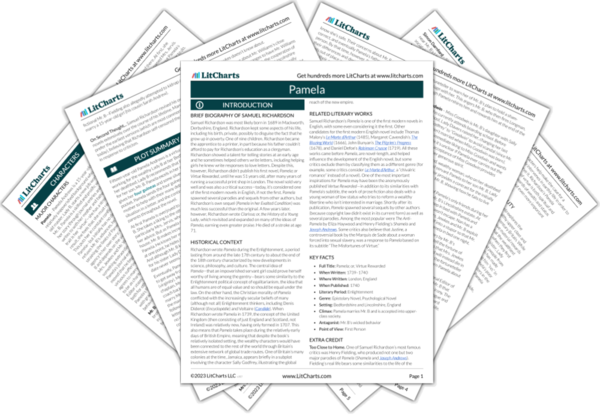Samuel Richardson’s Pamela explores the difference between the wealthy upper class and the poor lower class in 18th-century Britain. While virtuous characters in the book often receive material rewards for their good behavior, this doesn’t mean that the wealthiest characters are always the most moral. In fact, when they first appear, the wealthy Mr. B is a libertine, and his sister, Lady Davers, is full of old-fashioned prejudices against people from lower classes. Mr. B himself admits how his wealth has made him spoiled, and he isn’t used to other people telling him “no.” In contrast to these flawed upper-class characters, Pamela’s poor father and mother are among the most honest characters in the book, and the reverend Mr. Williams is much kinder to Pamela than Mr. B, despite his lower social status.
It might seem, then, that the novel is critical of the class divide, suggesting instead that class has little to do with a person’s character and that the class divide is not so extreme after all—and that the marriage of the upper-class Mr. B to his servant Pamela proves it. Still, many characters—including Pamela herself—worry that marrying Pamela might hurt Mr. B’s reputation, and ultimately the characters from the gentry only accept Pamela because she knows how to act like a member of the upper class, suggesting that the class divide is real after all—and that the novel upholds rather than criticizes it. It’s noteworthy that many of the lower-class characters with the best manners (including Mr. Jervis and Pamela’s parents) originally came from wealthier backgrounds but fell on hard times. By the end of the novel, Pamela marries Mr. B and so completes her transition to the upper class, and her charitable behavior toward all those around her suggests that she deserves the new authority she has gained. While Richardson’s Pamela challenges some aspects of the British class system by highlighting both the moral shortcomings of the upper class and the good morals of the lower class, it ultimately upholds the status quo by suggesting that members of the upper class deserve their privilege and power as long as they use it responsibly like Pamela.
Class and Morality ThemeTracker

Class and Morality Quotes in Pamela
Dear Father and Mother,
I have great Trouble, and some Comfort, to acquaint you with. The Trouble is, that my good Lady died of the Illness I mention’d to you, and left us all much griev’d for the loss of her; for she was a dear good lady, and kind to all us her servants.
I hope the good ’Squire has no Design: but when he has given you so much Money, and speaks so kindly to you, and praises your coming on; and, Oh, that fatal word! that he would be kind to you, if you would do as you should do, almost kills us with fears.
JOHN being to go your way, I am willing to write, because he is so willing to carry any thing for me. He says it does him good at his Heart to see you both, and to hear you talk. He says you are both so sensible, and so honest, that he always learns something from you to the Purpose.
For I am watch’d, and such-like, very narrowly; and he says to Mrs. Jervis, This girl is always scribbling; I think she may be better employ’d.
I sobb’d and cry’d most sadly. What a foolish Hussy you are! said he: Have I done you any Harm? Yes, Sir, said I, the greatest Harm in the world: You have taught me to forget myself and what belongs to me, and have lessen’d the Distance that Fortune has made between us, by demeaning yourself, to be so free to a poor Servant.
Their Riches often are a Snare;
At best, a pamper’d weighty Care:
Their Servants far more happy are:
At least, so thinketh Pamela.
Why now, says she, how strangely you talk! Are not the two Sexes made for one another? And is it not natural for a Gentleman to love a pretty Woman? And suppose he can obtain his Desires, is that so bad as cutting her Throat? And then the Wretch fell a laughing, and talk’d most impertinently, and shew’d me, that I had nothing to expect from her Virtue or Conscience
Fine clothes, sir, become not me; nor have I any ambition to wear them. I have greater pride in my poverty and meanness, than I should have in dress and finery.
Your poor Pamela cannot answer for the Liberties taken with her in her deplorable State of Death.
Now, said he, you are going—I boldly put my hand before his mouth, hardly knowing the liberty I took: Pray, sir, said I, don’t be angry; I have just done.
This Letter, when I expected some new Plot, has affected me more than any thing of that Sort could have done. For here is plainly his great Value for me confess’d, and his rigorous Behaviour accounted for in such a Manner, as tortures me much.
My master kindly said, Come, Mr. Andrews, you and I will sit together. And so took his Place at the Bottom of the Table, and set my Father on his Right-hand; and Sir Simon would sit on his Left.
But canst thou have the Vanity, the Pride, the Folly, said she, to think thyself actually marry’d to my Brother?
’Tis even so, my Dear, replied he; and you remember my Sister’s good-natur’d Hint of Miss Sally Godfrey? I do well, sir, answered I. But this is Miss Goodwin. Her Mother chose that name for her, said he, because she should not be called by her own.
Oh! What a poor thing is human Life in its best Enjoyments!—subjected to imaginary Evils, when it has no real ones to disturb it!
















